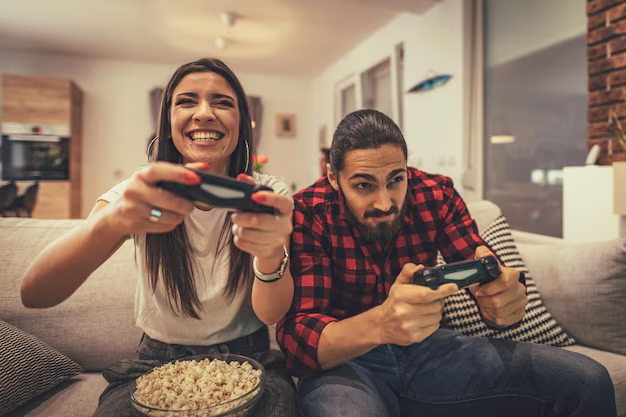In the past few decades, video games have evolved from simple, pixelated entertainment to complex, immersive experiences that engage players on multiple levels. While video games have been viewed primarily as recreational activities, there has been growing interest in their impact on mental health. The relationship between gaming and mental health is complex, and it varies depending on the nature of the games, the time spent playing, and the psychological traits of the players. This article explores the various ways that games can influence mental health, both positively and negatively.
The Positive Effects of Gaming on Mental Health
1. Stress Relief and Relaxation
One of the most commonly reported benefits of gaming is stress relief. Games, particularly those with soothing visuals, calming music, and engaging mechanics, can help individuals disconnect from their everyday stressors. Games such as Stardew Valley or Animal Crossing provide an escape, offering players an opportunity to relax in a virtual world where they can control the pace of events. For some, gaming offers a break from the real world, reducing stress and offering a mental recharge.
2. Cognitive Benefits
Numerous studies suggest that certain types of games, especially puzzle and strategy-based games, can help improve cognitive functions such as problem-solving, memory, and spatial awareness. Games like Portal and Tetris have been shown to improve mental agility by encouraging players to think critically and plan ahead. These cognitive workouts can stimulate the brain and improve its overall function, particularly in adults as they age.
3. Social Interaction and Community Building
Many modern games, particularly online multiplayer games like Fortnite, World of Warcraft, and Among Us, allow players to connect with others from around the world. For individuals who may struggle with social anxiety or isolation, these games offer a way to form meaningful relationships, build community, and work together toward common goals. Gaming communities can foster support and camaraderie, which can have a positive impact on mental health.
4. Emotional Resilience and Achievement
Games often present challenges that require perseverance, strategic thinking, and skill development. Overcoming these challenges, whether in a solo game or through teamwork, can instill a sense of achievement and boost self-esteem. Games that offer rewards for progressing through levels or completing tasks can provide players with a sense of accomplishment that can carry over into their real lives.
The Negative Effects of Gaming on Mental Health
1. Addiction and Compulsive Gaming
One of the most significant concerns regarding the impact of games on mental health is the potential for addiction. Some individuals may develop an unhealthy attachment to gaming, spending excessive amounts of time in virtual worlds to the detriment of their real-life responsibilities and relationships. This can lead to social isolation, decreased academic or work performance, and physical health issues such as poor sleep, eye strain, and lack of exercise. Gaming addiction is increasingly recognized as a mental health concern, with the World Health Organization (WHO) officially recognizing “gaming disorder” in 2018.
2. Increased Anxiety and Depression
While many games can be relaxing, others—especially competitive or combat-focused games—can increase stress and anxiety levels. The pressure to win, perform well, or meet in-game goals can lead to heightened anxiety, especially if players become overly invested in their virtual achievements. Furthermore, studies have shown that excessive gaming, especially when it displaces real-life social interaction, can lead to feelings of loneliness and depression. This is particularly true for individuals who use gaming as a coping mechanism to avoid addressing real-world emotional struggles.
3. Aggression and Desensitization
There has been ongoing debate about the potential link between violent video games and aggression. Some research suggests that exposure to violent video games can desensitize players to real-world violence, making them less empathetic or more likely to exhibit aggressive behavior. While this remains a controversial topic, certain studies have found a correlation between violent game play and increased hostility or impulsivity, particularly in younger players.
4. Disruption of Sleep Patterns
Gaming can also interfere with sleep, particularly when played late at night. The blue light emitted by screens can disrupt the body’s production of melatonin, the hormone responsible for regulating sleep. Additionally, the excitement or stress induced by certain games can keep players awake, leading to poor sleep hygiene and resulting in fatigue, irritability, and difficulty concentrating during the day.
FAQs
- Can video games improve mental health? Yes, video games can have positive effects on mental health, such as reducing stress, improving cognitive functions, and providing opportunities for social interaction.
- How can gaming cause addiction? Gaming addiction occurs when a person spends excessive time playing games to the point that it interferes with their personal, social, and professional life. The immersive nature of games can make it difficult for some to stop playing.
- Are violent video games harmful? There is debate on this issue. Some studies suggest that violent video games can increase aggression in players, while others argue that there is no clear evidence linking violent gaming to real-world violence.
- Can gaming help with depression? While gaming can serve as a temporary distraction, it is not a substitute for professional treatment. In some cases, gaming may exacerbate feelings of loneliness or depression, especially if used excessively to avoid real-world issues.
- What types of games are good for mental health? Games that promote relaxation, social interaction, and cognitive engagement, such as puzzle games, simulation games, and role-playing games, tend to have positive effects on mental health.
- How much gaming is too much? The key is moderation. If gaming starts to interfere with daily responsibilities, relationships, or mental well-being, it may be a sign of excessive gaming.
- Can games help with anxiety? Yes, certain games can help reduce anxiety by offering relaxation and providing an escape from stressors. However, competitive or high-stress games might increase anxiety for some players.
Conclusion
The impact of games on mental health is multifaceted. On one hand, they can provide stress relief, foster social connections, and promote cognitive development. On the other hand, excessive gaming can lead to negative consequences, including addiction, increased anxiety, and disrupted sleep. As with any form of entertainment or activity, balance is essential. When played in moderation and with awareness of its potential effects, gaming can be a positive force for mental well-being.
Key Takeaways
- Positive Impact: Games can reduce stress, enhance cognitive skills, and provide emotional resilience.
- Negative Impact: Gaming can lead to addiction, increased anxiety, and disrupted sleep patterns.
- Balance is Crucial: Moderate gaming can promote mental health, but excessive gaming should be avoided.
- Individual Differences Matter: The impact of gaming on mental health varies from person to person, depending on the game type and the player’s personality and mental health condition.

